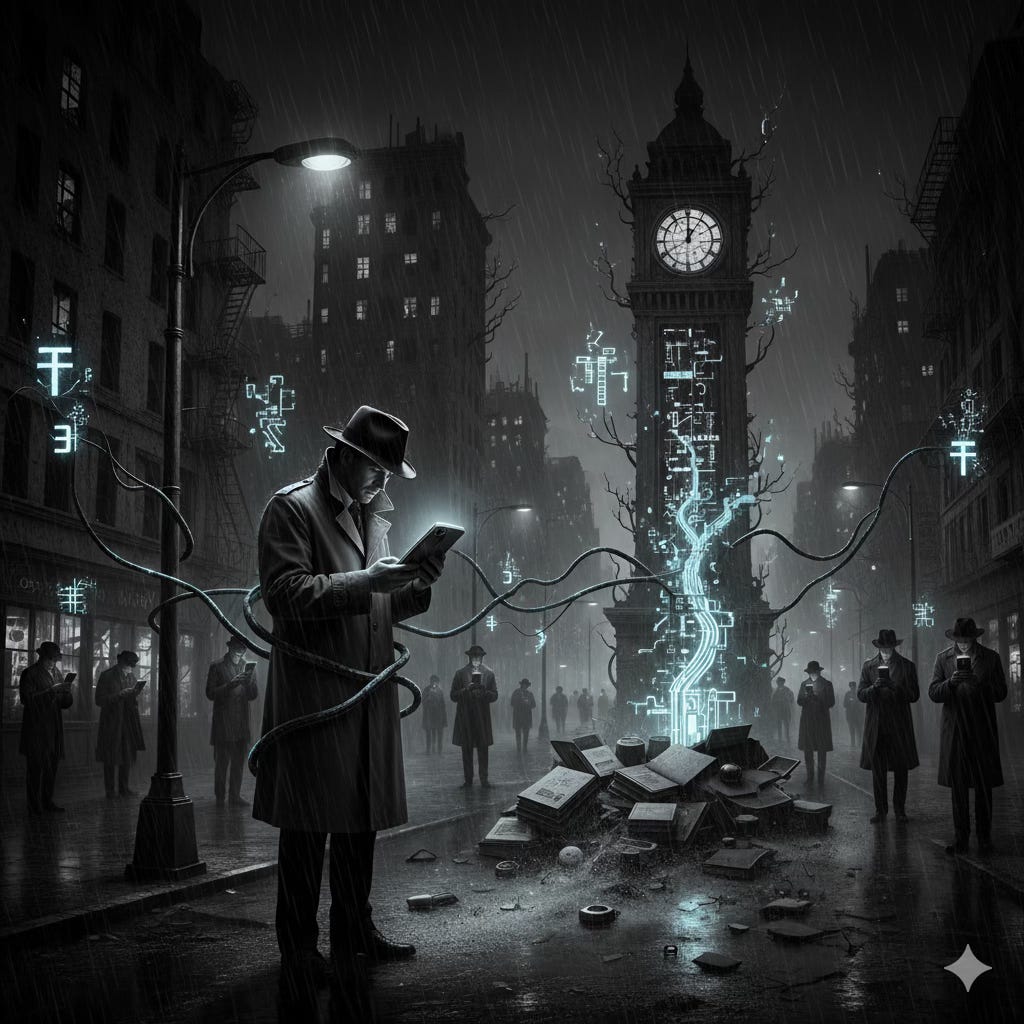On the eve of publishing How John Coltrane Changed Me - a Jazz Journey, some thoughts on what reading has become.
Nobody reads anymore. Don’t even try to argue. You don’t read—you scan, you skim, you swipe. You scroll until your thumb cramps, then you switch hands. Information comes in neon bursts now, little doses of sugar pumped into your veins by Silicon Valley hustlers with god complexes. The written word is face-down in the gutter, coughing up teeth, while TikTok influencers moonwalk over the corpse.
I remember books. Real books. Monstrous slabs of paper that weighed a ton and stank of mildew. They were trials by fire. You had to work for them. Decipher squiggly symbols, build whole universes in your head, chase arguments through page after page until your brain sweated like a boxer in round twelve. Reading was pain. Reading was glory. That pain built muscle. Now? People want everything soft-serve, pre-digested, blasted into their retinas with cartoon filters.
Television was the gateway drug. The smiling dealer on the corner. The first taste is free: “Relax, let us show you instead.” Then the Internet hit like a freight train of crack. You could mainline dopamine in broadband doses. Notifications, flashing banners, autoplay videos—the whole circus wired directly into your skull. Ten minutes became long-form, thirty seconds a commitment. Attention spans fell like Roman statues toppled in a drunken riot.
Brains adjusted. Rewired. The species evolved backwards. Homo sapiens with goldfish minds, unable to finish a paragraph without twitching toward the phone. Pavlov’s dog drooling every time the screen lit up. I’ve seen people pull out their phones mid-sentence, mid-meal, mid-conversation, chasing the next digital crumb. They don’t even know they’re addicts. They think this is “normal.” They think this is “life.”
Education joined the carnival. Forget textbooks. Forget reading. Here’s a rapping cartoon about the water cycle. Here’s a CGI cannon reenacting Waterloo with dramatic music. Here’s math explained by a YouTuber who cuts every two seconds to keep your feeble attention from drifting. Kids remember, sure—but they remember the show, not the substance. It’s education as snack food: fast, bright, empty.
Entertainment? Total collapse. Novels are museum pieces. Poetry is embalmed, lying in state. Satire lives in meme format now—your democracy explained by SpongeBob screenshots. Culture reduced to 8-second bursts of sarcasm and reaction gifs. The mob doesn’t want nuance. The mob wants dopamine. A billion voices screaming into the void, each one fighting to be louder, faster, dumber.
And me? I’m screaming because reading is the goddamn gym for your brain. If you don’t lift words, you go soft. You lose stamina. You lose the ability to hold contradictions in your head. You lose the patience for ambiguity. You lose irony. You become a houseplant with Wi-Fi. The algorithm feeds you, waters you, keeps you docile. And the men behind the curtain get rich while you click, swipe, repeat.
Look around. The damage is everywhere. People can’t hold conversations without collapsing into hashtags. Politicians rise on memes instead of policies. Whole populations radicalized by headlines they didn’t even finish. Reading is endurance. Reading is resistance. And without it, you’re not thinking—you’re consuming.
But books aren’t dead. Not yet. They’re in the shadows, waiting. They watch you from the shelf, covered in dust, whispering: pick me up if you dare. They know most of you won’t. Too hard. Too slow. Too boring. Better to scroll yourself into oblivion.
The future will be hybrid, sure—mutant half-breeds of text and video stitched together by techno-Frankensteins. Podcasts with transcripts, essays that look like graphic novels, e-books with glowing interactive widgets. Fine. Let them experiment. But never confuse seasoning for the meal. Words are the protein. Without them, the culture starves.
So here’s the question that will decide whether civilization has a brain left in fifty years: do you still have the will to read? Do you carve out an hour without screens, without alerts, just you and a book wrestling in silence? Or do you let the machines spoon-feed you animated mush until you’re drooling and docile, begging for more?
Because books won’t vanish. They’ll survive the apocalypse. They’ll outlast the apps. They’ll sit there on the shelf, smug and patient, laughing while you scroll yourself into extinction. And if you can’t muster the strength to open one, then you don’t deserve the words anyway.



I am on Day 10 of getting off TV! I realized it was a total addiction. It feels like I got my peace back. I am listening to music and READING. Just finished "Severance" (not anything to do with the TV show) and (the even more brilliant) "I Cheerfully Refuse" -- both dystopian -- and am about to start on Juneteenth. It is like cleaning my brain and - as you say - definitely exercising it. TV is just watching my life flickering away, especially the junk I was watching. There is good TV but I am clearly not one of those who can do it in moderation so it's back to books - and physical.
If reading a book, that is, reading what someone wrote, is the road back (and I think that it is), where does writing, actual writing, stand in strengthening our self? Perhaps what a person thinks about something becomes known only after picking up the pencil and a piece of paper.